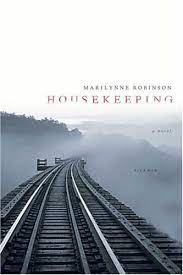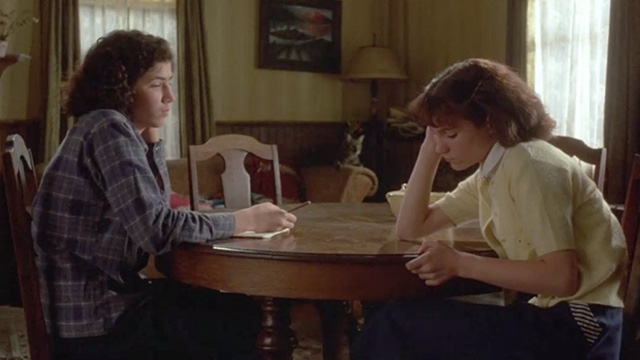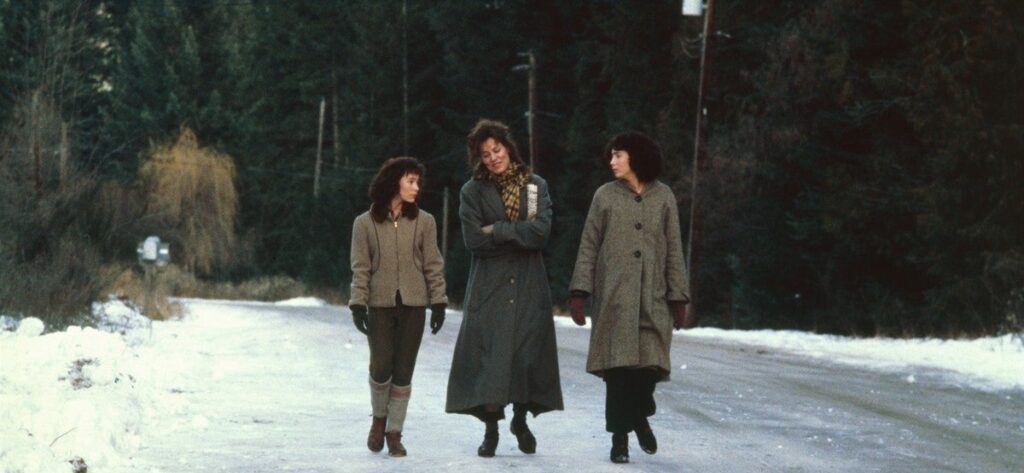About
Author: Marilynne Robinson (USA)
Genre: Domestic Fiction
Setting
Place: Idaho, USA
Time: 1950s
My Rating (see what this means)
My Subjective Rating: 3.5
My ‘Objective’ Rating: 3.4
Introduction

I had first read ‘Housekeeping’ several years ago, and I remember not being thrilled about the way it ended. This was despite the fact that the protagonist-narrator Ruth made a choice which I should have, at least on first-principles alone, been sympathetic towards.
The choice was between collective and individual identity, between conformity and non-conformity. And Ruth’s decision to choose her own path and not conform with societal expectations, left me with a very bad taste in my mouth.
So, when I picked the book to read again after all these years – I was looking to understand – Why?
Note: The summary and review below contains spoilers
Summary
“So I went up to my room and left my fate to work itself out, since I had no curiosity about what was destined for me, and no doubt.”
Ruthie, the narrator, and her sister Lucille hardly had much to choose from in their childhood – shuttled under the care of various family members – from a depressed mother who commits suicide to an emotionally unavailable grandmother, to grand-aunts who couldn’t wait to get back to their lives, and finally – the supremely idiosyncratic aunt Sylvie.
Understandably, Ruthie wasn’t really ready when, for the first time, she was forced to choose between her aunt Sylvie, who as a transient, and her sister Lucille, who had little patience for Sylvie’s behaviour – a choice she would have very much preferred not to have to make. The book essentially is a story about this choice.

Review
Prologue to the review:
As I was re-reading this book, I had some specific questions I was looking answers to for each of the characters and my review will try to explain my conclusions:
- Ruth – What explains her choosing Sylvie over Lucille? Was the choice correct for her?
- Sylvie – What made the transient Sylvie argee to settle down (for a while) in the first place?
- Lucille – ‘For that summer Lucille was still loyal to us’ – Ruth suggests at one point in the book? Was Lucille disloyal?

Ruthie
There is little doubt in my mind that Ruth’s decision to choose a drifting lifestyle with Sylvie was incorrect. The very few glimpses of the consequences of her choice we read in the final chapter argues much the same –
- Now and then I (Ruth) take a job as a waitress, or a clerk, and it is pleasant for a while. Sylvie and I see all the movies. But finally the imposture becomes burdensome, and obvious.
- When did I become so unlike other people? Either it was when I followed Sylvie across the bridge, and the lake claimed us, or it was when my mother left me waiting for her, and established in me the habit of waiting and expectation which makes any present moment most significant for what it does not contain. Or it was at my conception…Only to conclude that “… it was the crossing of the bridge [when she leaves with Sylvie] that changed me finally.”
Why did Ruthie choose Slyvie in the first place?
It is not surprising, given her childhood, that Ruth had abandonment issues. She sought to replace the blurring memory of her mother with that of Sylvie – and therefore accepted all the weirdness Sylvie bought with her. And she chose to shut down instead of confronting Sylvie, like Lucille did, on her behaviours (see Sylvie’s section below)
- It was pleasant when she (Sylvie) scolded us for coming in late, for playing in our school clothes, for staying out in the cold without our coats on.
- It seemed to me that if she could remain transient here, she would not have to leave.
- More words passed between Sylvie and Lucille, but I could not make them out. It seemed to me that whatever Lucille said, Sylvie sang back to her, but that was dreaming.
That not to say Ruth was ok with Sylvie’s choices –
- Sylvie smiled at me. “Pretty, isn’t it?”
“It’s pretty, but I don’t know how anyone could have wanted to live here.” - …and it was as if I (Ruth) were her (Sylvie) shadow, and moved after her only because she moved and not because I willed this pace, this pocketing of the hands, this tilt of the head.
- …and I stayed very still against her and hid the awkwardness and discomfort so that she would continue to hold me and sway.
So, I would argue that instead of ‘choosing’ to stay with Sylvie, Ruthie was locked into her choice by her inability to make one. That is not to say, she didn’t try – she tried to be ‘normal’ with Lucille for a while – but it turned out to be too taxing. I can only wonder, how future could have been different for her if only Lucille was more patient with her.
- “Yes.” What could it matter? It seemed to me that the fragility of our household was by now so great that the breach was inevitable, and so it was futile to worry whether there was wisdom or sense in any particular scheme to save it. One thing or another would put an end to it soon.
Slyvie

Sylvie is often described as eccentric, dreamy, carefree, leading an unexamined life. She has been drifting for several years before she decide to settle down to take care of her nieces. But even the most sympathetic reader, will have to accept that Sylvie was not suited for the task of raising 2 young girls. Far from being a loving presence (which the girls very much needed) – she failed to meet even the most modest of expectations – serving cooked, not-canned food, or ensuring they went to school. Worse – she hated even the very little she did –
- “She’s leaving,” I (Ruth) said.
“She always does that. She just wanders away.” Lucille picked up her dish towel and threw it at the front door. [This was when Lucille had demanded normal adult behaviour from her]
Which begs the questions – why did she take it up in the first place? Was it because the grandaunts Lily and Nona simply left before she could comprehend the responsibility and got locked into it? Or was it her attempt to get out of her own drifting life, in a way?
We certainly don’t know enough about Sylvie’s life to understand why she was the way she was. But her actions can be instructive to make a guess about her reasons – “It is a terrible thing to break up a family”. She tells the sheriff when it seems that the court might intervene to take Ruth away from her. If she really believed this statement herself, she certainly didn’t do anything to prevent the breakup of the family when Lucille was leaving. It can even be argued she was glad Lucille left – for Lucille demanded that she act like a parent, as someone who loved, or at least cared.
- “Now you’re (Ruth) in on my (Sylvie) secret. Maybe you’ll have better luck. And at least we don’t have to hurry. It was so hard to get home in time for you and Lucille.” [Lucille had left the house to live with a teacher]
So, when she suddenly tries acting like a responsible adult – when it seems Ruth will also be taken away, it is quite uncharacteristic of her. But this is what leads me to believe that she was not just locked into the situation of looking after her nieces. She wanted to have at least one stable relationship in her life, while not having to give up any of her drifting life.
Ruth unfortunately ends up the victim of her selfishness. “It’s not the worst thing, Ruthie, drifting. You’ll see. You’ll see.”
Lucille
Lucille and Ruth were the closest of companions, excited when a potential motherly presence of Aunt Sylvie was to start looking after them. But when Lucille realises Sylvie is incapable of offering them any love or affection – she starts cultivating a ‘normal’ social life – drifting towards schoolmates and eventually moves out to live with a teacher. She tries to bring Lucille along, but is impatient, even cruel to her indecisiveness.
In Ruth’s narration, Lucille is often cast as the antagonist. I strongly object – because Lucille only mistake seemed to be that she demanded, quite reasonably for a young girl I would add, love and care from Aunt Sylvie – while Ruth was happy to keep hoping for it – “…to cease to hope would be the final betrayal”.
Epilogue to my Review
So, how do I reconcile the contradictions to my first principles – now that I am convinced, again, that Ruth’s choice was wrong?
In the conventional sense, it is true that Ruth, who chose a life of a transient, seemed to have chosen individuality. But in fact, it was her sister Lucille – who by fighting to remain ‘normal’ really stood up for individuality.
But was Lucille’s choice right?
We don’t really know what happened to her. What we get from the novel is speculations from the now much older Ruth – who never really tried to re-establish contact. But we can put the possibilities Ruth imagines themselves in perspective –
- (Lucille) …waited there (their old house) in a fury of righteousness, cleansing and polishing, all these years. She thinks she hears someone on the walk, and hurries to open the door, too eager to wait for the bell. In this scenario she is also snuggling with her pretty daughters in her lap OR
- Lucille in Boston, at a table in a restaurant, waiting for a friend. She is tastefully dressed – wearing, say, a tweed suit with an amber scarf at the throat
In both this situations, Ruth imagines that – No one watching this woman (future Lucille)…. could know how her thoughts are thronged by our absence, or know how she does not watch, does not listen, does not wait, does not hope, and always for me and Sylvie.
But that only clears the haze around Ruth’s tragedy. Ruth, not Lucille, is the narrator of the novel because she is the one unable to move on.
Ruth pre-empts my conclusions and dismisses it by arguing that “…it was important to believe (for the townsfolk) that I (Ruth) should be rescued, and that rescue was possible.” Re-reading the book has convinced me townsfolk were right (this time)!
Picture Credits:
1. Housekeeping Movie (1987)